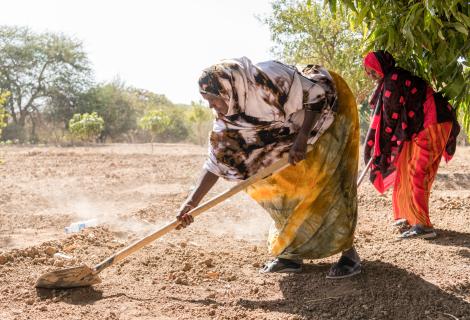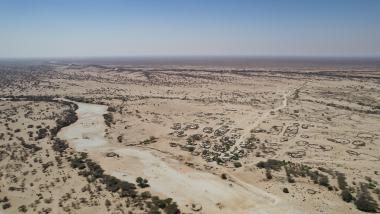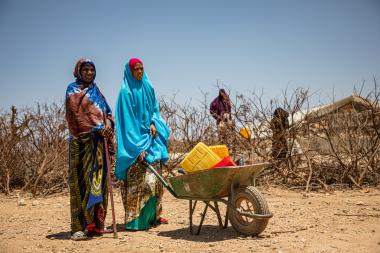Drought in East Africa: How communities in Somaliland are adapting

East Africa is currently facing the worst drought for decades and yet there remains little to no attention to the severity of the situation. With the number of emergencies rapidly growing in the face of climate change, raising the awareness and vital funds needed to respond to the crisis, remains incredibly challenging.
Families across Somaliland are facing chronic food and water shortages and whilst the latest rains at the end of 2022 went some way to improve the situation and meant that famine has been narrowly averted for now, the situation remains critical. The changing weather patterns including the drought are having an extensive impact on the people in this region. The environment, water resources and agriculture are badly affected. Continuous efforts are needed to help meet the immediate needs of families, who have suffered from five failed rainy seasons, and to work to build their communities resilience to the persistent threat of droughts and other climate shocks. The upcoming rainy season, in April – June, is due to be the sixth consecutive failed or below average rainy season, providing families with little in the way of respite to restore their livelihoods.
In addition to the ongoing and severe drought across Somaliland, the conflict over the disputed city of Laas Canood in the east of Somaliland has caused mass displacement. Thousands of people have been displaced from the city, travelling both across the border to Puntland, Somalia and to surrounding communities close to Laas Canood. 89% of the displaced population are thought to be women and children who have left their homes with very limited means to purchase food, water and other basic needs. The displacement is also increasing pressure on water, food, health and education services in the host communities, where families are already battling the impacts of chronic drought with over half the population facing severe food insecurity. Having joined ActionAid at the end of 2022, as the Director of Asia and Humanitarian Programmes, I wanted to see the important work that ActionAid is doing to respond to this largely unseen crisis and understand how we as an organisation can continue to raise awareness of the needs and better support the communities we work alongside.

Driving through the country, it was clear to see the devastating impact that the drought was having, the land which was often barren with rivers were completely dried up. During my time in Somaliland, I visited two communities in very different contexts that ActionAid works in, Salahley and Gabily.
The town of Salahley hosts one of the biggest camps in Somaliland for internally displaced people, where 1,200 people are currently living. These families are amongst a large number of people moving to urban areas due to the impact of the drought on their lives and livelihoods. These communities are now unlikely to return to their former livelihoods and have precarious and limited opportunities in the places they are hosted. The area is severally affected by drought, with some households facing the highest levels of food insecurity in the country. Services in Salahley are incredibly limited, with little access to healthcare facilities and schools. There is also poor access to sustainable water sources, meaning water often gets trucked into the area or people are forced to use poor quality undrinkable water which leads to disease and illness.
ActionAid has been working in Salahley since 2016, working with local women’s groups to set up women’s safe spaces, deliver training and awareness activities on gender based violence. Last year, ActionAid worked with the camp management committee in Salahley camp to provide cash grants to help 400 families to meet their basic needs.

The committee spoke to us about the need for better access to water, shelter and skills based training for income generation. The area is close to the Ethiopia boarder, where many pastoralists pass through in search of water. There is a water point in Salahley but it is salty and despite this, people still come for the water as they have no other option. The rains are expected to be poor again next rainy season and further drought is likely, meaning more internally displaced people are expected arrive in Salahley, placing further pressure on local services and the host community.
Whilst in Salahley, one women invited us into her shop that she had set up, with the second of two cash payments that ActionAid had provided to families living in the camp with. Suleekha, 31, is the sole breadwinner to her young family of eight, since her husband had an accident meaning he could not work. Prior to the drought, they owned over 200 animals but due to the harsh conditions, they all died. When Suleekha was selected to receive cash payments, she used the first payment to pay for food, items her children needed for school and to pay off her debts. With the second payment, she wanted to make a sustainable investment so set up a small shop, where she sells vegetables to the community. With further support, the community want to deliver skills based training to help other families to secure a sustainable livelihood.
In Gabiley, where ActionAid has been working since 2006, I was immediately struck by the work that the community had been doing to manage the water sources and cultivate the land. The land was green and crops were growing well, like a lush oasis in this barren landscape. The farmer offered me an orange grown in his small orchard and the delicious zesty freshness of the orange cut through my parched mouth and the heat of the day like nothing I'd tasted before. For me, the sight of diverse crop cultivation, water harvesting and pumping, soil and water conservation to adapt to the drought, was like a ray of hope in terms of the success communities can have adapting to the drought and ensuring their resilience and survival through these harsh conditions.
When we arrived, we were welcomed into the women’s safe space, where the 30 women that make up the coalition have been working together to support their whole community. The group have learnt literacy and numeracy skills as a foundation of growing their businesses and told us that since receiving the training, they are now able to support their children with their education, which is a key priority for the village. They were supported to build their leadership and communication skills and grow their businesses. Through the trainings they learnt how women can become active members of the community and how they could connect to the services that they needed in the main town, Gaibley.
The group manage initiatives such as a self-help group, revolving fund and women’s coalitions. Through the self-help group, the women all pay $1.50 per month into the group to support members with any issues that they face or to help them grow their businesses. One of the woman told us that recently the group had helped her to resolve an issue with her water supply.
For the revolving fund, women receive a grant of $300 to invest into her business. Once awarded the grant, they pay it back over 10 months so that it can be transferred onto another women. The women have used it to support their businesses in farming, transporting vegetables to market and clothes selling. During the drought, it became harder to return the funds but they still have the fund within and want to start activating it again as well as using it to support women in neighbouring villages. Other initiatives included the establishment of cooperative groups, where groups of five women worked together to develop a business, using a $2,500 fund.
ActionAid and the community have worked to adapt their farming skills to become more resilient to climate change and build sustainable water sources, including shallow wells, earth dams and berkeds, to collect and store water for drinking and irrigation, and trained water management committees to help manage and maintain the water sources. The shallow wells are typically connected to a pump and requires men in the community to climb into the well to switch it on. The women told us that now, their priority is to get solar panels installed, which means that shallow wells don’t need expensive fuel for pumps or to be switched on manually. This is a key priority as it would not only allow for good irrigation, helping to double their yields, but it would also empower women to work independently to collect water without relying on the men.
Another key focus for the group is tackling gender-based violence. Girls as young as six or seven go through FGM, causing serious health issues for the rest of their lives. One woman spoke about how she had many challenges as a young woman and during childbirth and spoke about how the community used to practise type 3 but now, thanks to training and awareness raising, they reject the practise. Prior to work of the women’s group, if there was a rape case in the community, the perpetrator would be sat down under a tree with village elders to discuss the matter and would then be asked to pay a fine. Now, thanks to the training, they know how to take these cases to the courts and get access to justice. They also now share the information of GBV cases across the community so that everyone is aware of what has happened and are aware of the issues.
But when the drought hit, many farms dried out and animals died and their businesses were severely affected. Due to inflation, prices doubled for fuel and produce. The women were unable to sell their produce at a rate in line with inflation due to quality and quantity issues and with the right access to markets. In the last three years, it hasn’t just been the drought that the community have been battling, it’s also been covid and dengue fever – and despite the strong sense of community resilience, it has been really challenging for them and the surrounding 40 villages. When pastoralists passed through the village in recent months, in search of water, the community were able to speak to ActionAid to work together to support them.
Drought has had a severe impact on the environment and the socio-economic welfare of the societies in the East Africa region. Climate change, land use change and socio-political and institutional transitions in East Africa have caused recurrent droughts. A better understanding of the causes and impacts of droughts, participatory management and community level actions are essential for building resilience to drought. As well as strong citizen-government-stakeholder cooperation is also valuable in monitoring and managing drought.
In the coming months, ActionAid Somaliland is also expanding its presence across Somalia, seeking to work with local women’s groups to prevent gender-based violence, build resilience through improved access to water and adapting farming practises in the face of climate change. There is an urgent need for more funding towards this response and with your support, ActionAid will be able to work on more long-term and sustainable programmes.